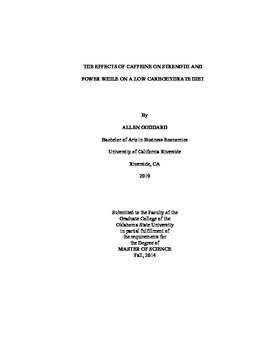| dc.contributor.advisor | Goddard, Allen J. | |
| dc.contributor.author | Goddard, Allen Jeffrey | |
| dc.date.accessioned | 2016-01-20T15:44:33Z | |
| dc.date.available | 2016-01-20T15:44:33Z | |
| dc.date.issued | 2014-12-01 | |
| dc.identifier.uri | https://hdl.handle.net/11244/25652 | |
| dc.description.abstract | Abstract: Low carbohydrate diets, in athletes and the general population alike, can lead to hindered performance during physical activity as compared to those who eat 50-70% of daily caloric intake as carbohydrates. This leads to the question of whether or not there is a solution to compensate for reductions in power production, which could enhance performance. The purpose of this study is to compare caffeine intake 60 minutes prior to a training session to a placebo, on muscle power output. The subjects used in this study consisted of 12 individuals split into two groups; both groups were put on a low carbohydrate diet. Subjects were asked to be on the diet for a minimum of 48 hours prior to any testing. On the first day subjects completed a baseline test, on the second and third round of testing one of the two groups were given a dose of 5 mg per kg of body weight of either caffeine or a placebo consisting of a glass of water. First the subjects completed a leg extension/leg curl muscular strength and endurance test on a Biodex isokinetic machine at 180 degrees per second for 50 reps. Following the leg extension/leg curl the subject completed a vertical jump using a Tendo unit machine to measure power output, for two rounds (each round consisting of a single jump) with a one-minute break. The third week they completed the same test in a counterbalanced measure. No significance was found in any of the variables measured but the largest differences are in peak power of the vertical jump, peak torque of the quadriceps, and percent decline of the quadriceps. Peak power of the vertical jump was between 100-250 J higher during the treatment session than they were during the placebo session. Athletes and the general population alike see cutting down on carbohydrates as the quick fix to decreasing body fat, getting leaner, and gaining a competitive edge. What this study attempted to prove, and potentially can be shown with further research with a large sample size, is that a dosage of caffeine 60 minutes prior to activity can compensate for the negative effects on performance of a low carbohydrate diet that are often overlooked. | |
| dc.format | application/pdf | |
| dc.language | en_US | |
| dc.publisher | Oklahoma State University | |
| dc.rights | Copyright is held by the author who has granted the Oklahoma State University Library the non-exclusive right to share this material in its institutional repository. Contact Digital Library Services at lib-dls@okstate.edu or 405-744-9161 for the permission policy on the use, reproduction or distribution of this material. | |
| dc.title | Effects of Caffeine on Strength and Power While on a Low Carbohydrate Diet | |
| dc.type | text | |
| dc.contributor.committeeMember | Smith, Doug | |
| dc.contributor.committeeMember | Jacobson, Bert | |
| dc.contributor.committeeMember | O'Brien, Matthew | |
| osu.filename | Goddard_okstate_0664M_13610.pdf | |
| osu.accesstype | Open Access | |
| dc.description.department | Health Care Administration | |
| dc.type.genre | Thesis | |
